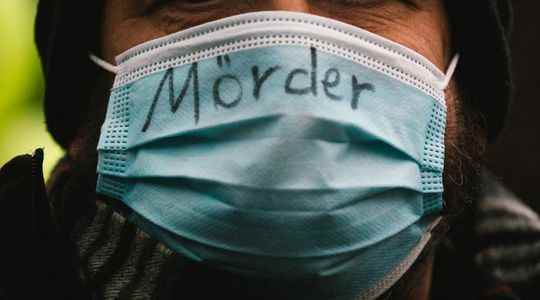And suddenly, the tension goes up a notch. In the same movement, the antivax surround the Berlin church of Gethsemane, protected by the police. “Freedom! Down with the dictatorship!”, they chant on the sidewalks opposite. Holding her child by the hand, a mother advances towards the faithful of the parish. “Why all this hatred against us? Do you want to gas us or what?” she screams. “Calm down! We too have the right to demonstrate, replies a young man, pro-vaccine. And we have the right to say that you are marching alongside Nazis!”
Demonstration and counter-demonstration
For months, antivax have been gathering in front of this high place of the 1989 revolution – this church was indeed the main meeting point for opponents of the communist regime. But this appropriation of collective memory by antivax does not please everyone. “At the time of the GDR, people were fighting for the right to demonstrate and to travel. This has nothing to do with what is happening today”, notes Aljona Hofmann, pastor of the Church of Gethsemane, who lived through the 1989 revolution as a theology student in Rostock. Like other parishioners and residents of the neighborhood, she therefore got into the habit of opposing these antivax, in order to prevent them “from occupying the ground”.
After Olaf Scholz declared war on antivax during his general policy speech on December 15 to the Federal Assembly (Bundestag), the silent majority is slowly waking up in Germany. Like Macron, the German chancellor has promised to “piss off” antivax. “Our democracy will be able to defend itself,” he warned, calling the antivax “a tiny minority of extremists”.
Death threats
But with his plan to make vaccination compulsory in Germany, Olaf Scholz took the risk of hardening the confrontation and weakening social cohesion battered by the health crisis. “Like the yellow vests in France, the German antivax are the symptom of a growing lack of confidence in democracy. These people no longer feel represented politically, not even by the far right”, analyzes Sophia Hunger, expert on protest movements at the Center for Social Research in Berlin. “Antivax can become a danger to state security. We can no longer rule out the risk of an attack,” she said.
Since then, death threats have multiplied against politicians, scientists and journalists. In December, the police dismantled an anti-vax group which plotted an attack against the Minister-President of Saxony on the secure messaging service Telegram.
Vaccine opponents no longer have any qualms marching past the private homes of local elected officials, armed with torches in reference to the Nazi demonstrations of force in the 1930s. In Berlin, they keep watch in front of the office of the public television channel (ZDF) or in front of health centers to rail against employees, calling them “useful idiots of the pharmaceutical industry”.
Esotericism & co
Antivax are most visible in the former regions of communist Germany, where the vaccination rate is the lowest in the country and the number of far-right voters the largest. They are instrumentalized by far-right groups such as “Der III. Weg” (the third voice), “Freie Sachsen” (Free Saxony) or the identities of the AfD (Alternative für Deutschland), represented in the Bundestag. But they are also found in Bavaria or in Baden-Württemberg (south-west), the cradle of German esoteric movements.
To circumvent the authorizations to demonstrate, subject to wearing a mask, the antivax decided to play cat and mouse with the police by “walking” in the streets. Since then, they have been called “walkers” (Spaziergänger). Impossible to control these small autonomous groups guided by orders given on the Telegram network, which move like electrons. In this chaos, the public force is unable to impose any authority. “They make fun of the state. That’s their goal”, comments Sophia Hunger.
The antivax movement is all the more important as doubts grow about the effectiveness of this vaccination obligation. Omicron’s less severe impact on hospitalizations and the lifting of restrictions called into question the urgency of a project refused by all candidates in the September 2021 elections, including Scholz himself. The chancellor is no longer at all certain of being able to secure a majority in parliament.
Outcasts
Nearly half of the liberal deputies of the FDP, one of the three parties of the Scholz government, will table a motion against the vaccination obligation during a vote scheduled … before Easter, when Scholz wanted it to come into force in early March. Nearly half of the liberal deputies of the FDP, one of the three parties of the Scholz government, have indeed tabled a motion against the vaccination obligation. The figurehead of these “slingers”, Wolfgang Kubicki, believes that this law risks ruining citizens’ confidence in democracy. “It’s not just neo-Nazis who refuse to be vaccinated, dropped the vice-president of the Bundestag. By making the vaccination obligation a duty of solidarity, we risk stigmatizing people who have personal reasons to s ‘oppose it and make them pariahs of society,’ he said to loud applause from the far right.
“With this kind of position, Wolfgang Kubicki stirs up the debate even more”, regrets Frank Brettschneider. This communication expert from the University of Hohenheim nevertheless thinks that German antivax are overhyped and that they will lose their influence after the end of health restrictions. “Olaf Scholz is right to call them a minority, he concludes. We cannot yet speak of a divided society as it is, for example, in the United States.”,
